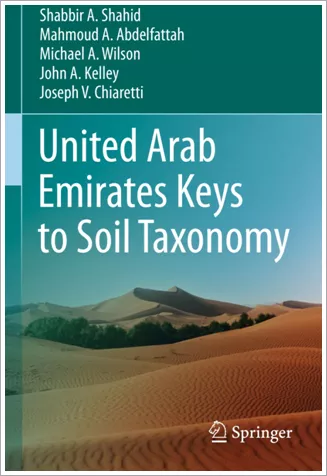Publication of the United Arab Emirates Keys to Soil Taxonomy
The International Center for Biosaline Agriculture (ICBA) and the Environment Agency - Abu Dhabi (EAD), announced today the publication of a book on classification of soils in the United Arab Emirates. The United Arab Emirates Keys to Soil Taxonomy is the result of a joint cooperation between ICBA, EAD, and United States Department of Agriculture – Natural Resources Conservation Service (USDA-NRCS). The book provides information for keying out the soils of the United Arab Emirates and the arid Gulf Cooperation Council Countries (GCC) into separate classes and to provide a guide to associated laboratory methods.
Dr. Ismahane Elouafi, Director General of ICBA said that science-based soil information will support decision makers in making informed decisions on future land use planning based on the capacity of different soil regions in the UAE. “It is important to locate soils that are suitable for agricultural expansion to reduce the gap between local food production and imported food. In addition the use of suitable soils for agriculture will optimize resources used for production and save the environment,” added Dr Elouafi, who suggested that the agriculture technologies developed in the UAE can then be successfully adopted in the region, where such soils may exist, saving time and financial resources.
Dr. Shabbir Shahid—Senior Soil Scientist at ICBA and the principal author of the book—defines soil taxonomy as the systematic categorization of soils based on distinguishing characteristics as well as criteria that dictate choices for different uses. He describes the book on the UAE keys to soil taxonomy as a user friendly guide for those who are searching soils suitable for various uses. This helps locate and match soils of special characters to the appropriate usages resulting in optimal use and environmental protection.
“The book specifically addresses soil taxonomy in the UAE; however, it is equally good for use in the GCC, which have major common soil orders, (Aridisols and Entisols)” said Dr Shahid, who added “I believe soil researchers in future will benefit from this valuable resource in their endeavor to assess soil resources in the UAE and the Gulf Region. This will lead to transfer of technologies established on similar soils and environmental conditions in the region where such soils may exist, and accordingly save significant investment.””
ICBA has taken many initiatives to contribute to its host country, the UAE. The initiative of publishing The United Arab Emirates Keys to Soil Taxonomy is a follow up to ICBA’s contribution to soil mapping and development of the Abu Dhabi Soil Information System (ADSIS) done jointly with Environment Agency – Abu Dhabi, the ADSIS later updated to the United Arab Emirates Soil Information System (UAESIS).
“The United Arab Emirates Keys to Soil Taxonomy will be the only source to learn about UAE soil taxa, and thus this will be the preferred book for agricultural graduates studying soil science,” concluded Dr. Shahid and Dr. Mahmoud Abdelfattah, co-author of the book, who extended their deepest gratitude to the various partners who supported the project mainly: ICBA, EAD and USDA-NRCS.
